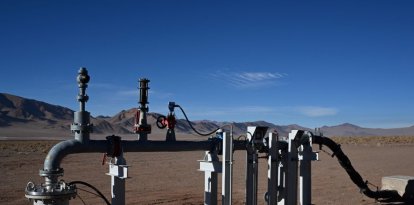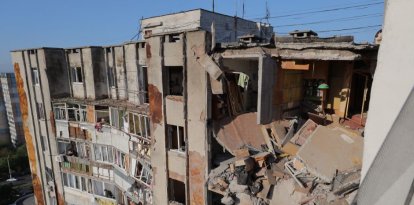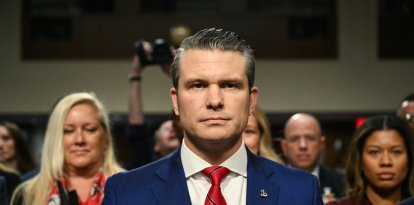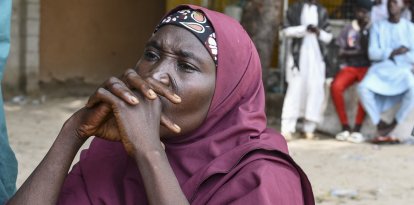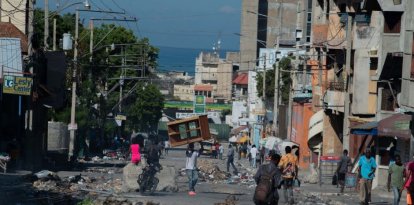El Salvador: The results from Nayib Bukele's first term
The current president faces a very likely re-election after his first five years in office.

(
Nayib Bukele, "The Philosopher King," as described in X (Twitter), will be on the ballot for the general election in El Salvador this Sunday. He defied the Constitution to run for re-election, becoming the only president in the modern Salvadoran era who has dared to do so.
Working in his favor, he has one of the best approval ratings for a Latin American president in the history of the region. After five years as president of the republic, Bukele has established his notoriety, for better or worse, both in his country and abroad.
At the center of this fame is his so-called "war" against the maras, the gangs that devastated the country and which led to the legacy of previous governments being defined by a terrible rate of homicide and violence. Since 2019, Bukele has transformed the country with a heavy hand. Here is a look at Bukele's presidency so far ahead of the election that is practically being served to him on a silver platter.
'Bukelazos' of 2020 and 2021
Since coming to power after his victory in the 2019 elections, Bukele was clear that without safety and order, there would be no prosperity in an El Salvador that was still feeling the burden of years of civil war in the 1990s and early 2000s. In 2015, El Salvador suffered from an annual homicide rate of 106.3 per 100,000 inhabitants.
In 2019, when Bukele became president, the rate was lowered to 38 per 100,000, but it was still too much in the eyes of the president. Bukele prepared a plan to improve the state's security forces that required an extra expenditure despite the country's debt, which caused his first run-in with the Salvadoran Constitution.
This extra budget item of $109 million required the permission of the Legislative Assembly, the country's unicameral body, then controlled by the opposition to Bukele. In a show of force that earned him his first major criticism outside the country, Bukele entered Congress with around 40 armed members of the Army. The members of the Assembly considered Bukele's gesture as a coup d'état, and he was reprimanded by the Salvadoran justice system.
In 2021, he once again shocked the international community with his second "Bukelazo." This time, with a Legislative Assembly controlled by his party, Nuevas Ideas, he dismissed the judges of the Supreme Court, in addition to the State Attorney General, under the pretext that they were acting against the Constitution and the country. Despite the fact that the courts declared the vote by the Legislative Assembly illegal, President Bukele achieved his objective.
During this period, the president maintained a high popularity rating. The Salvadoran electorate supported him at all times. Between May 2020 and August 2021, the different polling firms gave him no less than 86.5% approval among citizens.
War on crime
Once Nuevas Ideas achieved a majority in the Salvadoran Parliament, Bukele's government began an all-out offensive against the gangs, which would earn him international fame and the respect of several conservative sectors in the United States.
The key to ending crime was the state of emergency that the Bukele administration established in March 2022. The rule allowed increased deployment of military and police forces. With the establishment of a curfew, mass raids and the expansion of the state's power, the gangs found themselves cornered.
In 2023, data from the Salvadoran government indicated that the average homicide rate per day fell to 0.4 points, the lowest in the entire history of the country. This made El Salvador the second-safest country in all of North and South America, only below Canada. In the summer of the same year, Bukele was also celebrated a total of 365 non-consecutive days without a homicide, achieved for the first time during the young president's term.
Megaprisons
The large detention centers for gang members became another of the most emblematic signatures of Bukele's first term. The images of hundreds and even thousands of prisoners with shaved heads wearing only underwear and crowded in lines in the prison courtyards made their way around the world.
The construction of the Terrorism Confinement Center (CECOT), with the capacity to house more than 40,000 prisoners in conditions that were criticized by several international organizations, did not go unnoticed in other Latin American countries. In Ecuador, days before an open war with narco-terrorists broke out, President Daniel Noboa announced the creation of facilities similar to those in El Salvador.
In Medellín, Colombia, local authorities resorted to 'Bukelian' tactics to announce the construction of new detention centers. However, analysts assured that exporting Bukele's methods outside El Salvador is not possible. It is clear that, at least, the reputation and image of the Salvadoran president is one of success in his fight against crime.
Are the Salvadoran people with Bukele?
Outside of CECOT, the Salvadoran population could breathe easily again, without the threat of gangs. The change from one president to another has never been so evident in the Central American country. Bukele represented a true revolution, and Salvadorans realized it.
Behind this success, which seems to be reflected at the polls this Sunday, is the terrible opinion that the Salvadoran population has of gangs. Ioan Grillo, an expert on drug cartels and the world of gangs, assures that Salvadoran gangs, unlike Colombian or Mexican criminal organizations, do not have significant income from drug trafficking. Instead, they bleed the population with petty crime and robberies. The locals therefore have little sympathy for the gangs' members.
Gallup, TReseach, Fundación Ungo and the Graphic Press have been measuring public opinion throughout Bukele's term. Although the sample size of their surveys is fewer than 1,500 people, Bukele has yet to drop below 80.7% approval, which happened in a TResearch poll in June 2022. The highest approval rating came in a Gallup poll, which, in November 2023, hit 92%.
Second term?
Nayib Bukele announced his candidacy for re-election in mid-2023 and made it official in October, defying history by becoming the first president in El Salvador's modern era to run for a second term. With the decision to seek re-election, he once again took on the Salvadoran Constitution, which does not allow a president to be a candidate in an election.
However, Bukele's campaign relies on the fine print of the 1983 Constitution. The text specifies that "anyone who has held the Presidency of the Republic for more than six months, consecutive or not, during the immediately preceding period, or within the last six months prior to the beginning of the presidential period" is ineligible to run. For this reason, Bukele claimed to have left the position that, however, he still holds on an interim basis.
Several associations condemned this move from Bukele, including Salvadoran legal associations, which claim that the move annuls the Constitution. Even with all this, current polls reflect 70% support for the "Bitcoin President," which puts El Salvador on track for five more years with Bukele.
RECOMMENDATION
